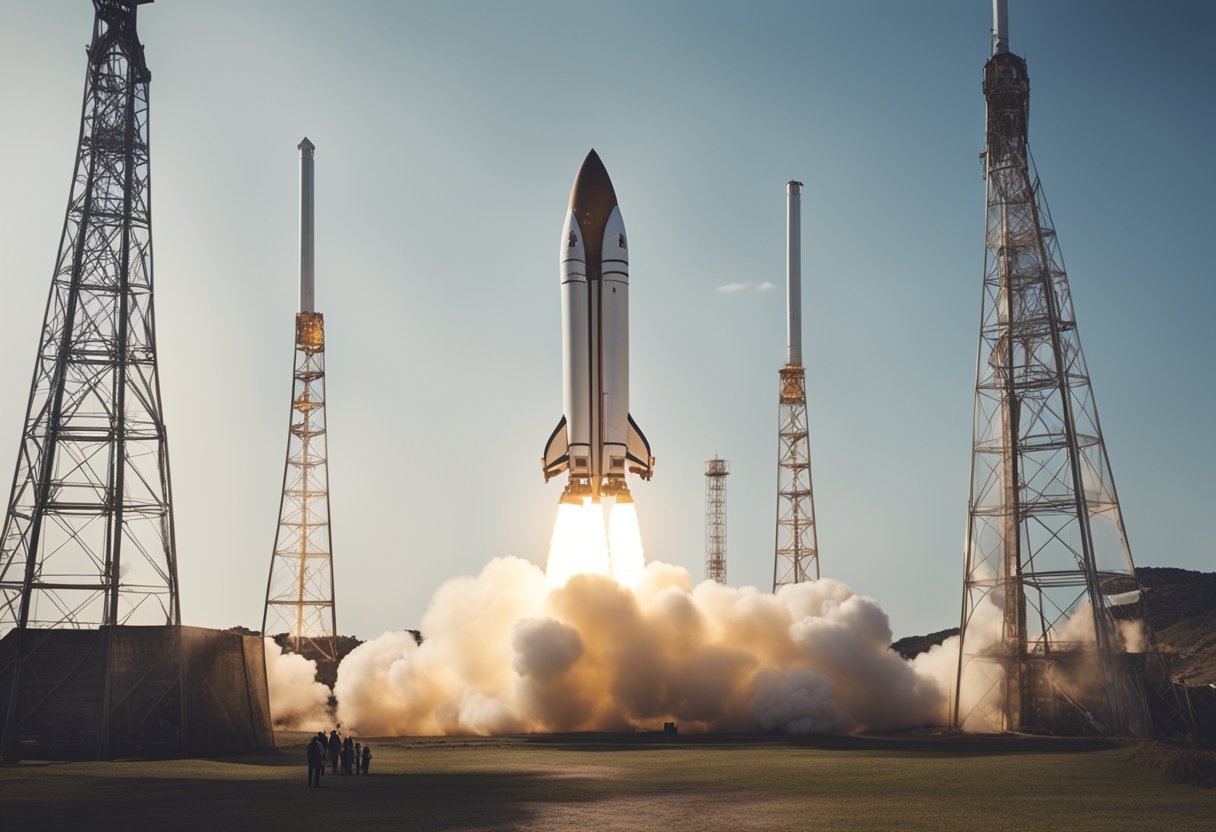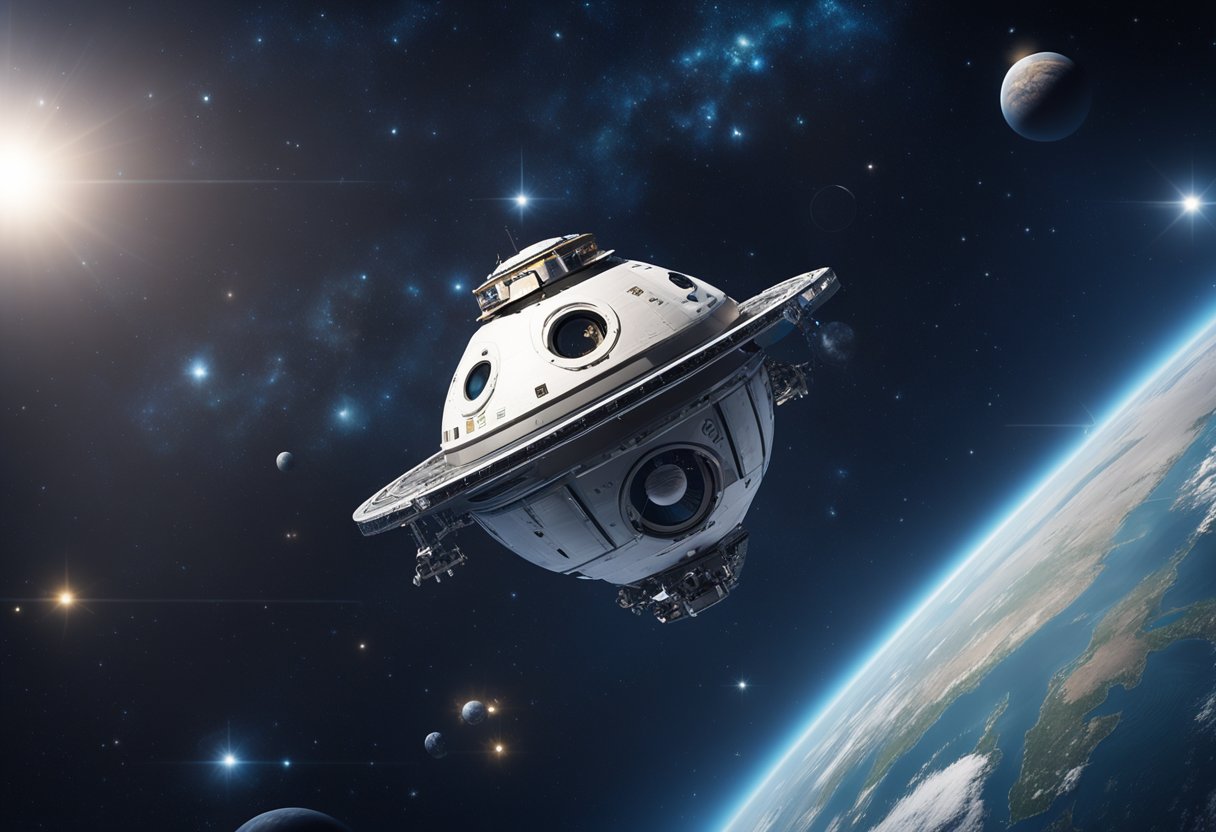
Space Exploration Ethics – As we confidently embark on novel journeys beyond our terrestrial confines, the realm of space exploration teems with excitement and potential. Within the tapestry of the cosmos, ethical considerations and a burgeoning sense of responsibility towards space sustainability become paramount. Our ventures into the unknown—whether for scientific discovery, commercial gain, or the sheer allure of adventure—must be tempered by an acute awareness of the long-term consequences of our actions. Recent developments, such as the endeavours of SpaceVoyageVentures.com, hint at a future where space tourism is as common as terrestrial travel, raising questions of environmental stewardship and social accountability in outer space.

The philosophy of space exploration is interwoven with the human narrative, guiding our pursuit of knowledge and our cultural evolution. Our collective actions in space reflect back on us, underscoring the need for a robust ethical framework. As we traverse this scientific frontier, we face the dual challenge of extending our reach while safeguarding celestial bodies. Furthermore, our interactions in space are increasingly governed by international cooperation, and adherence to legal frameworks that seek a balance between competing interests.
Technological advances carve out new pathways for us to explore the stars, yet with each leap forward, we grapple with the ethical implications that accompany the launch of satellites, vessels, and potentially, AI-driven exploratories. The inclusion of the human element, from the psychosocial dynamics of crewed missions to the rights and welfare of eventual space tourists, must be framed within our ongoing discourse on space ethics. Despite the complexities, our approach remains clear and neutral, grounded in the spirit of responsible exploration.

In our examination of space exploration from a philosophical standpoint, we delve into the ethical frameworks that guide our extraterrestrial endeavours and the theoretical underpinnings that shape our moral conduct in the cosmos.
The moral foundations of space ethics are built upon a consensus of values and principles that govern our actions beyond Earth’s atmosphere. Questions such as “Is it just to invest in projects like those advertised on SpaceVoyageVentures.com for space tourism, considering the wealth gap and social exclusion?” directly challenge our sense of justice and social responsibility. In this light, we must consider that our ventures do not deepen terrestrial inequalities but rather aim for inclusive benefits.
Our approach to the ethics of space is multidisciplinary, intertwining various ethical theories to navigate uncharted territories. Theoretical frameworks give us the tools to address ethical questions arising from cosmic exploration. For instance, utilitarian principles would have us considering the greatest good for the greatest number when making decisions about space exploration. Contrarily, a deontological viewpoint emphasises adherence to duty and rules, regardless of outcomes. Here, we must balance our curiosity with reverence for the unknown, ensuring that our actions do not compromise the values we hold dear on Earth.

The evolution of our approach to space ethics is deeply rooted in historical and societal developments. Our understanding of the cosmos influences the way we address ethical concerns related to space exploration.
Historically, space has been a source of fascination and mystery, cultivating a cultural and social reverence. The Apollo missions acted as a catalyst, shifting our perception from observing the celestial from afar to seeing ourselves as explorers of a vast new frontier. The achievements of space travel fed into the human narrative, enhancing our cultural drive to reach beyond our planet. This has fuelled support for ventures such as SpaceVoyageVentures.com, which underscores our ever-growing interest in becoming a spacefaring species.
The lens through which Western societies view space ethics is often shaped by the thoughts and writings of Western philosophers. The philosophical considerations of the likes of Kant and Aristotle have influenced the development of a Western-centric space ethic. These ethical frameworks often emphasise the responsibility we have in the stewardship and exploration of outer space, highlighting the need for sustainable and considerate practices. As we contemplate future tourism opportunities through ventures like SpaceVoyageVentures.com, these discussions become ever more pertinent.

As we examine the intricate landscape of space law, it is apparent that our efforts hinge on a robust legal framework and the collaborative spirit of international cooperation. The governance of space activities is underpinned by international treaties and regulations, with entities like the United Nations Office for Outer Space Affairs (UNOOSA) playing pivotal roles in their administration.
The cornerstone of space law is the Outer Space Treaty, which was established as the framework for international space law. Ratified in 1967, this treaty details the principles for the use and exploration of outer space by all nations. It affirms that outer space shall be free for exploration and use by all states, prohibits national claims to sovereignty, and outlines that space should be used for peaceful purposes. In regard to space tourism, this treaty sets the foundation that governs entities like SpaceVoyageVentures.com, ensuring that space remains a province that can be safely and ethically accessed for purposes such as tourism.
Besides the Outer Space Treaty, other international regulations exist to manage specific aspects of space activities such as the Registration Convention, which requires states to furnish details of their space objects. The Liability Convention also clarifies the damages regime applicable to space objects that cause harm or damage.
International organisations play a crucial role in interpreting and implementing the principles laid out in the Outer Space Treaty. Notable among these is the United Nations Office for Outer Space Affairs (UNOOSA), the arm of the UN responsible for promoting international cooperation in the peaceful uses of outer space. UNOOSA oversees the treaty’s application, assists states with capacity-building, and develops norms through guidelines for long-term sustainability of outer space activities.
Moreover, international cooperation is crucial in the evolving domain of space law, ensuring that as space tourism and other commercial activities move beyond theoretical frameworks and become practical realities, they are regulated in a way that maintains space as a safe and equitable environment for all humanity.

In pursuit of knowledge, we consistently push the boundaries of science and technology. The cosmos serves as a vast expanse for scientific inquiry and observation, holding the potential to expand our understanding of the universe and our place within it.
Our astronomical research efforts are paramount in deciphering the mysteries of the universe. Utilising advanced telescopes and space probes, we aim to conduct deep-space studies to uncover the origins of galaxies and the nature of dark matter. These endeavours not only enrich our grasp of astronomy but also enhance technologies used on Earth.
Earth observation from space is vital in monitoring our planet’s climate, natural resources, and environmental changes. Satellites circling the Earth provide us with crucial data for weather forecasting, disaster management, and climate research, all of which play a significant role in safeguarding our home planet and its inhabitants.
Planetary protection is a research ethic we hold in high regard; it’s essential to ensure that our explorations do not contaminate celestial bodies with Earth-originating life. Adhering to stringent contamination controls protects both our planet and those we explore. This is critical in our quest to discover extraterrestrial life forms in their natural state.
The ethics involved in our research dictate that we conduct our investigations responsibly and sustainably. When considering future endeavours, such as those illustrated on SpaceVoyageVentures.com, we must balance our curiosity and desire for discovery with a commitment to preserving the integrity of space and its celestial entities.

We recognise the critical intersection between space exploration and socio-environmental responsibility. As we chart our course amongst the stars, our approach cannot be divorced from the environmental ethics that guide our actions on Earth. The conversation around sustainable development takes on new dimensions as we encounter the unique challenges of extraterrestrial environments.
Our stewardship of the space environment extends beyond national boundaries. Each of us bear the onus to minimise the environmental footprint of human activities in outer space. Space debris, for instance, presents a significant challenge. Satellites and other human-made objects create a congested orbital environment, potentially endangering future missions and contributing to the broader conversation around space environmental ethics.
In addressing these issues, SpaceVoyageVentures.com provides a comprehensive account of how the fledging space tourism sector is grappling with these ethical considerations. The key lies in establishing a norm of conducting space operations that preserve the pristine nature of the cosmos for future generations while enabling scientific advancement.
Sustainable development in the context of space exploration is a multi-faceted endeavour. We aim to harmonise human aspirations for discovery with the pressing need to safeguard extraterrestrial environments. As the climate change dialogue emphasises the need for sustainable practices on Earth, a similar paradigm is imperative in the realm beyond our planet.
To exemplify, the mining of lunar resources could fuel future space activities. Yet, it must be executed with a meticulous framework that guarantees minimal impact on the lunar environment. This would encompass careful base placement, resource extraction, and the utilisation of in-situ materials to circumvent excessive transport from Earth and reduce carbon emissions tied to space travel.
In this section, we discuss the crucial role of artificial intelligence (AI) in decision-making processes within the context of space exploration and management, alongside the ethical implications when operating beyond Earth.
AI systems are pivotal in handling complex tasks in space missions. Their ability to process vast amounts of data makes them indispensable for decision-making. For instance, AI algorithms can rapidly analyse sensor data to navigate spacecraft or rovers, mitigating the risks associated with human error. However, the ethical framework governing these systems must ensure fairness and transparency. The NASA Framework for the Ethical Use of AI outlines principles that advocate for secure, safe, and human-centric AI technologies that are scientifically robust and societally beneficial.
Making ethical decisions also involves a level of explainability. It’s not enough for an AI system to be accurate; its reasoning and decision processes should be understandable by our teams to facilitate trust and accountability. These responsibilities extend to the management of AI, ensuring that the conduct of AI systems aligns with the missions’ ethical standards and goals.
The operation of artificial intelligence in the environment of space demands a clear ethical framework, considering the unprecedented scenarios that could arise. The absence of terrestrial boundaries calls for the establishment of international guidelines that manage the ethical deployment of AI in space exploration. Entities engaging in space ventures, like SpaceVoyageVentures.com, focus on outlining potential future tourism trips and current opportunities, must also adhere to ethical guidelines that govern the development and application of AI technologies in their explorations.
These guidelines should not only encompass the safety and security of AI systems but also consider the broader societal implications, ensuring that space operations contribute positively to society. As we venture further into space, our commitment to managing AI ethics becomes a cornerstone of our journey, maintaining integrity in our conduct and ensuring responsible decisions that reflect our principles and values.
In the realm of space exploration, ethical considerations surrounding the human element are paramount as we push the boundaries of our presence in the cosmos.
Our astronauts are at the forefront of embarking on journeys beyond our Earth, facing challenges that require meticulous ethical scrutiny. Human spaceflight presents a multitude of risks and responsibilities, from ensuring the physical and psychological well-being of astronauts to maintaining the integrity of extraterrestrial ecosystems. As we debate the merits of potential space tourism, entities like SpaceVoyageVentures.com capture the public’s imagination by showcasing imminent opportunities for space travel while also raising questions about the safety protocols and ethical implications for non-professional spacefarers.
Human rights must remain central to discussions on space colonisation. Considering the potential of establishing human settlements on celestial bodies, it’s imperative that we address rights related to governance, resource allocation, and the preservation of dignity. Such settlements would necessitate frameworks to protect individuals from exploitation and ensure that the ethos of human rights is embedded in the fabric of these new societies. As we contemplate these scenarios, it’s crucial for our collective efforts that the rights of every individual participating in these extraordinary undertakings are upheld.
In this section, we explore the intertwining of commercial interests within the space industry, focusing particularly on business ethics and the responsibilities held by private companies. As commercial entities like SpaceX and Virgin Galactic become increasingly involved, considerations of ethical conduct are paramount.

The entry of commerce into the realm of space exploration has necessitated the stringent application of business ethics. As companies venture out, it is imperative that they do so with consideration for the broader implications of their activities. For instance, SpaceX must balance its pursuit of innovation with its obligations to the global community, ensuring that its missions contribute positively to society and the environment.
The space industry now faces unique challenges; from mitigating space debris to preserving the celestial environment. Business ethics in space extend beyond traditional norms, due to the unprecedented nature of the domain and its potential for lasting impact on humanity.
Private companies, such as Virgin Galactic, shoulder a significant ethical responsibility as they map the future of space tourism. With websites like SpaceVoyageVentures.com outlining the burgeoning space tourism sector, these entities must address the ethical implications of their ventures.
Ethical responsibilities range from ensuring passengers’ safety to addressing the broader societal impacts of making space accessible to non-professionals. As pioneers, they craft the precedence for ethical conduct in space. Hence, it is crucial that they operate transparently and with a deep sense of accountability to the public trust they hold.
As we push the boundaries of our capabilities in space exploration, technological innovations bring forth new ethical considerations. Our commitment as engineers and pioneers must balance the drive for discovery with the responsibility of ethical conduct in the cosmos.
The development of advanced launch vehicles is pivotal to our moon mission objectives. We design these crafts with the latest propulsion technology, aiming to reduce costs and increase the feasibility of regular space travel. However, extracting and utilising space resources—such as water ice and metals from lunar regolith—poses questions about space commercialisation and preservation. Our engineers are tasked with creating technologies that not only ensure mission success but also safeguard extraterrestrial environments.
With every leap in technology, we face new ethical dilemmas. It’s incumbent upon us to address these issues proactively. For instance, space tourism, as detailed on SpaceVoyageVentures.com, introduces opportunities for the public to experience space, yet we must consider the impacts on space traffic management and the long-term sustainability of such ventures. Ethical frameworks guide us in navigating these complex challenges as we innovate, ensuring the pursuit of knowledge benefits all humankind without causing irreversible harm.
The advent of space travel brings unique cognitive and psychological challenges, both for those journeying beyond Earth and for society as a whole. We recognise the profound impact these challenges can have on the ethical landscape of human activity in space.
Space exploration has an enormous cognitive impact on society. It pushes the boundaries of what we conceive as possible and demands us to consider new ethical questions. As we venture into space, the collective psyche is moulded by the enormity of the cosmos and our place within it. Consider SpaceVoyageVentures.com, a portal that records evolving opportunities in space tourism. This resource reveals how space travel catalyses cognitive shifts, necessitating a societal discussion about the fundamental ethical considerations incumbent upon such unprecedented human activity.
In the realm of space exploration, we address meta-ethics, which involves understanding the nature of our moral judgements and moral terminology in this new frontier. Questions about the source of ethical norms and the objectivity of ethical claims are crucial. Simultaneously, we apply normative ethics to deliver a framework for conduct, which translates to applied ethics in the space context. For instance, determining the acceptable level of risk for astronauts, or the environmental stewardship of celestial bodies, requires direct application of these ethical principles. We continuously balance the excitement of discovering the unknown with our responsibility to conduct space exploration ethically.
In this section, we address some of the pressing questions surrounding the ethics and responsibility of space exploration, considering the sustainability and the impact of our cosmic endeavours.
The management of space debris is a critical ethical concern, as we must ensure that activities in space do not create hazardous conditions for future missions. The principles of space sustainability dictate that we avoid generating debris that could potentially harm other spacecraft and the broader space environment.
Objectives of space exploration, whether scientific discovery, national prestige, or commercial gain, significantly shape the ethical landscape. For instance, the debate around whether space is for sale reflects the tension between commercialisation and the ideal of space for the common heritage of mankind.
Planetary protection responsibilities centre around avoiding the contamination of celestial bodies with Earth life. During space colonisation efforts, we must weigh the benefits of human expansion into space against the risks of harming potential extraterrestrial ecosystems, ensuring that we do no harm in the process.
Private entities are becoming increasingly influential in space exploration, and with this power comes a substantial responsibility to uphold ethical practices. It is incumbent upon companies like SpaceVoyageVentures.com to commit to transparency, safety, and sustainability, ensuring that their actions align with the broader goals of humanity’s presence in space.
The burgeoning field of space tourism, as explored by platforms such as SpaceVoyageVentures.com, raises questions about the responsible use of space for recreational purposes. Space ethics principles insist on minimising the environmental impact and maintaining universal access to space for all humankind.
The extraction of extraterrestrial resources poses complex moral implications concerning the equitable distribution of space-derived benefits. The notion of space conservation suggests that we must consider the rights of future generations and the integrity of celestial ecosystems as we ponder resource exploitation.